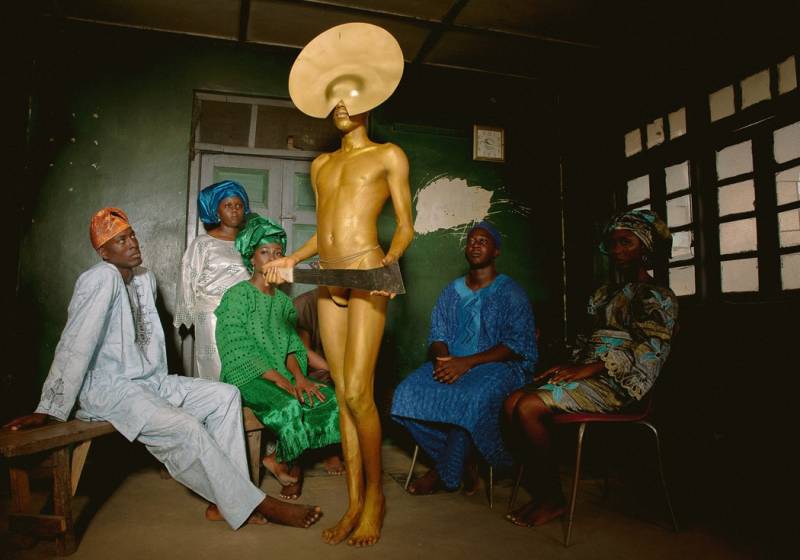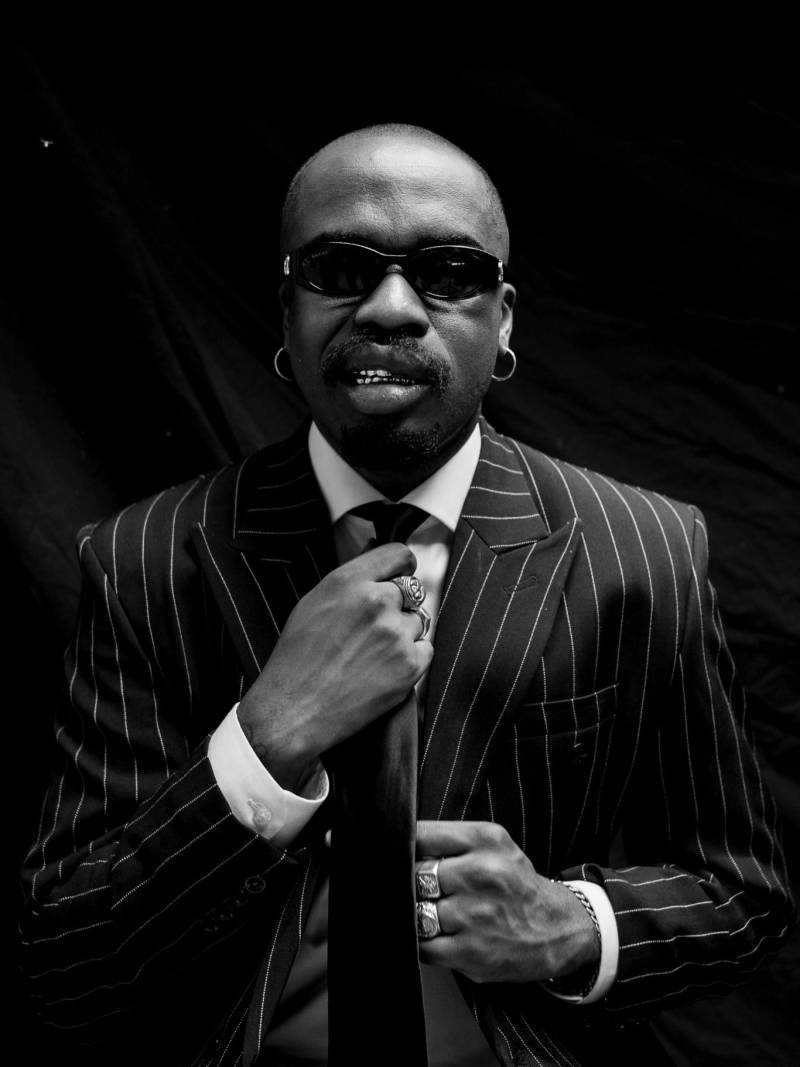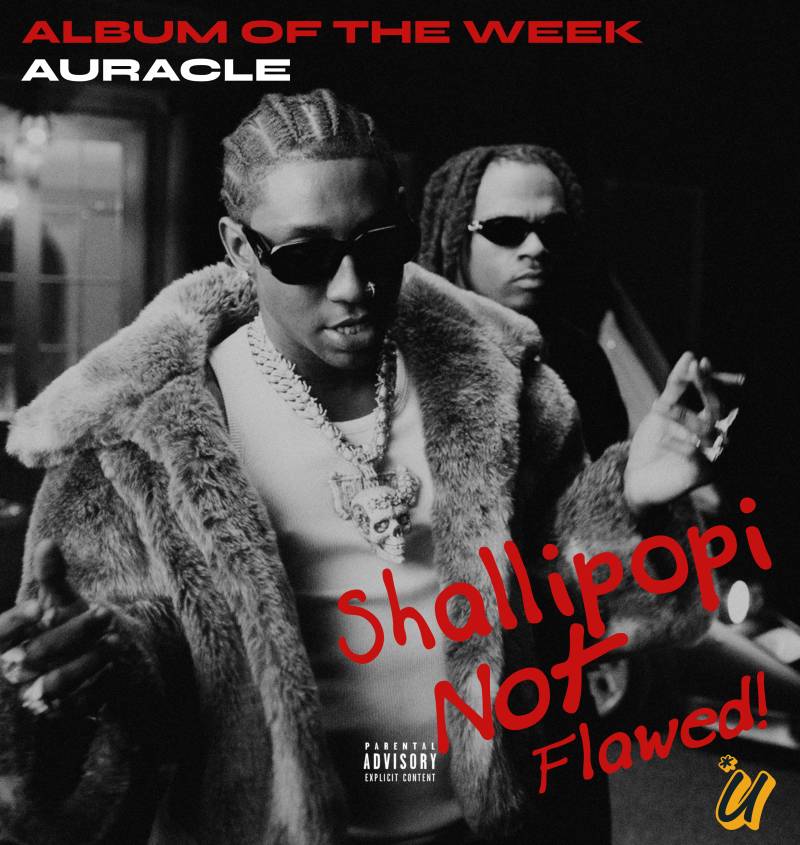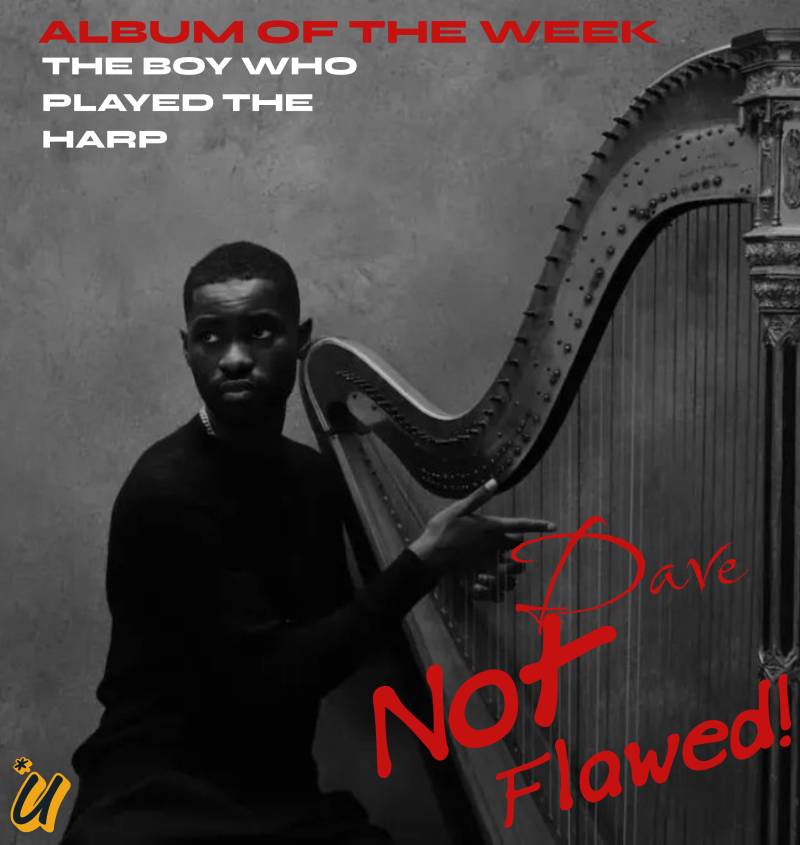On October 20, 2020, the Nigerian Army massacred at least 12 protestors of the #EndSARS movement – while injuring dozens of others – at the Lekki Toll Gate in south Lagos as they rallied peacefully against police brutality.

Photographer, stylist, and director Daniel Obasi has lived in Lagos for most of his life and had visited the site the previous day to deliver water bottles to protestors. He would have returned had it not been his sister’s birthday on what would be the day of the killings. The horror that unfolded at that time haunts him – as it does many other Nigerians who witnessed these senseless murders or lost someone they loved. It’s not a feeling that’s easy to shake.

Obasi turned to his work to channel his emotions – shock, horror, despair – when Louis Vuitton, as part of its Fashion Eye series, approached him to make a photographic document of Lagos. Last week, Obasi released the resulting book, Beautiful Resistance: “an ode to the Queer minority community in Nigeria and young Nigerians who stood up against police brutality and political corruption.”

“If we can’t protest on the ground, we must find other ways to protest with our work and how we live,” Obasi tells me over Zoom, speaking from Arles Photo Festival in France, where the book is launching.
Channeled through a surreal and fantasy-like lens synonymous with Obasi’s work, the artist contemplates the massacre and the city he calls home while situating it in a hopeful future where queer minorities hold power. This Afrofuturist metropolis is punctuated with documentary shots that ground us in the present, in this world we share, reminding us of the inhumanity of the massacre and the injustices many Nigerians still face at home.
Below, Obasi shares his hopes for the book in the lead-up to Nigeria’s elections, the importance of fantasy to tell stories, and how he manages to find respite despite the danger of living truthfully.
What were you thinking about when you started this book?
Daniel Obasi: If I need to talk about Lagos, it’s not just going to be about the structure or the landscape – it’s going to be about all of the nuances I’ve seen and experienced. The ideas coming to me were about revolution. Young people were very fed up, you could hear that in the conversations on Twitter and in the street. There were strikes and all these crazy things going on. It felt more real because when we were younger our parents dealt with [everything]. But in 2019, we realized the need to get involved in politics and in what happens in this country. If not, we’re going to be dealing with [the consequences] for the next however many years.
I began to peel back some layers, do some sketches, and I thought about feminism, about how we’re not even allowed to protest, about oppression – that the straight, young people still want to oppress us. Everyone wants a beautiful country, but they’re not interested in what we have to say. Then there’s the police brutality. Police could stop any person and profile them – my friends were always getting stopped. It was chaotic. A lot of that was heavy on my mind. The next thing you know, boom, a huge protest erupted. I knew it was coming because of the way everything was intensifying. The killing at the toll gate shook everybody to a point where they couldn’t believe it would go that far.
I wanted to make sure that whatever I was creating exists to remind, even myself, that this did happen, and we did experience it. I almost went there on the day of the shooting, but it was my sister’s birthday. People were singing the national anthem, and waving the Nigerian flag, and they just kept shooting. I tried to recreate more of the moody, sordid, intense feeling – everything I felt, poured into the book.
Why did you choose that image for the cover?

Daniel Obasi: It represents very feminine energy. A lot of times, we describe our country from a female perspective – like ‘she’, ‘her’. I felt like the country was weeping or in a dire, bloody, and confused state. In the interview [in the book], I talk about the sun on the Nigerian flag, first designed by the person who created it many years ago, but they removed the red sun because they felt it was a bad omen. [During the protest] people were using that same flag to cover peoples’ wounds, and the red came back [through the blood], so it was very symbolic. I wanted to find an interesting way to illustrate that in the book and hold your attention.
Your work deals with a lot of social issues; why do you choose to filter them through the lens of fantasy rather than just being direct?
Daniel Obasi: It’s the way I see things. We’re drawn to many harsh realities every day with the news and the media. It’s so direct. With fine art and fashion photography, it’s great to create, for lack of a better word, a superficial world. Something beautiful that can talk about the clothes and all of that, but creates a conversation around these things through whatever point of view you have.
My point of view has always been very surrealist, Afrofuturistic, and fantasy-like, building what I feel could be an alternative in visual storytelling. I’m never trying to come from a place whereby I’m sitting in oppression – some visuals do that. I’m interested in going away from oppression to create an alternative where power switches to the minorities – where you see the minorities taking over or taking up the spaces visually. Maybe that’s my way of hoping that such becomes our reality over time.
It must all be very heavy, especially when revisiting the ideas in this book, the massacre. How do you step out of that at the end of the day?
Daniel Obasi: You don’t really; the trauma stays with you. There are places you go where you have to dim yourself. There’s always this need to have a safe space, so I created one where I live, so my friends often come there. We all unpack and have fun and live and breathe without anyone feeling judged. Knowing you’re not the only one going through these challenges is important.
There’s a shot in the book that says ‘Move For The Gays’. I tweeted that during the protests because they were telling the gays to wait for people to finish fighting for police brutality before they could come and protest. It was like, no, we’re here. We’ve been experiencing this longer than anyone else; why shouldn’t our protests matter? I felt very upset about that because they were kicking many people out of the protest. Imagine that. If we can’t protest on the ground, we must find other ways to protest with our work and how we live.
As we all grow together, the work we create will become bolder, more empowered, and more daring. Before, I would never have been able to make work that was this direct, this daring, even when I did ‘Corridors of Power’. Things are becoming more real and more intense. It’s no longer about trying to hide what you’re trying to say; it’s now more like, okay, we’re in this conversation, and we’re having this conversation now.
There’s a risk involved for simply living your truth. Is that where the title of the book, Beautiful Resistance, comes from?
Daniel Obasi: I feel like this is a beautiful way to protest – even just having the privilege to be able to make a book and pull out my thoughts, feelings, and ideas and how I felt about all of this. Not a lot of people have that privilege. A lot of people lost their lives trying to protest the same thing.
Resistance is not supposed to be beautiful. Oppression... you’re resisting a government that doesn’t like you, doesn’t care about you, or whether you’re alive or not – a world that would not give you a second chance if it had its way. So to be able to survive all of that, for me, is beautiful. Growing up and being unsure of who you are, spending your life wondering if you’re a mistake or if there’s something wrong with you. Many of my friends could not even talk about their sexuality in public. Now it’s a bit better. People have grown to a place of empowerment where they can own themselves and their truth, coexist with all these different problems and find ways to navigate and find joy. It’s not perfect, but to wake up every day in a country like that, or in a world like that, I think that’s beautiful. I think that’s strong; I think that’s empowering; and I think that’s the resilience that will help many of us get to the next phase of our lives.

What do you want to achieve with this book? Is it a reminder of what happened?
Daniel Obasi: There’s an election next year, and it will determine many things for many Nigerians. Sexuality aside, just like the daily standard of living and being able to wake up and survive. People’s lives and livelihoods are literally at stake. So it’s more real than ever, and I think this time around, many young people have turned out to register to vote. We’ve stepped into that space to say we’re going to be involved, even though we’re afraid that the elections will be rigged, or [there will be] corruption. There have only been two parties in the country, and we need to break that circle. We need to step away from those people.
With this book, I feel like it’s to remind you this happened three years ago – don’t forget that. There’s a reason why this is happening. I don’t know if this book will get to a lot of Nigerians, but I’m very keen on seeing that it exists. I remember that moment; I was almost there that day. It might be the last time I ever do a whole Lagos-type project. It’s just intense. But I feel like this is a good way to remember Lagos and my experiences with it.
I was intrigued by the juxtaposition of the fantasy images with the everyday shots, like the bridge or the city-scapes. As you said, it reminds you that you are actually in a city, like you are in a place where people live rather than a fantasy.

Daniel Obasi: Yes. Almost like you can feel where this is coming from. That you know this place or you’ve been there before is right happening in your space and around you. It’s more intentional in that you can feel these things more closely because they’re streets you remember, roads you’ve been on, places you can go and visit, and these issues are happening in real-time. So you can connect to it. I see myself from the point of view of a writer or a painter, creating a fictional world that draws on these realities. Lagos is a real place, and people are living these realities in this space, so it’s almost an upside-down POV of what Lagos is – at least from my point of view.





